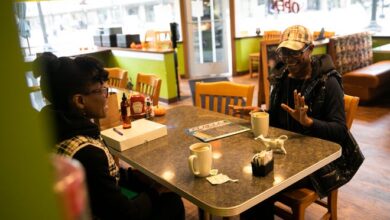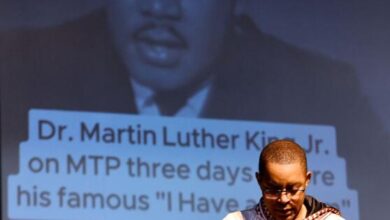How to support Black-owned businesses in Cedar Rapids, Iowa City

Four years ago, Brea Dixon of Cedar Rapids tried to get a Facebook page dedicated to supporting local black-owned businesses in Cedar Rapids going. It didn’t gain much traction, and she moved on to other things.
Jump to list of Black owned businesses near you
Now, she’s trying again. Lists of black-owned businesses have circulated over the last week on social media and have been printed in places like the Los Angeles Times and Esquire magazine. Something is different now, Dixon said, and it goes deeper than people suddenly wanting to support restaurants or shops.
Four years ago she started her page, facebook.com/buyblackcr, after a black Cedar Rapids resident, Jerime Mitchell, was shot and paralyzed by white Cedar Rapids police officer Lucas Jones. A grand jury declined to charge Jones, who returned to active service. A lawsuit against him and the city of Cedar Rapids by the Mitchell family is ongoing.
Mitchell’s friends and family held vigils and protests in 2016, but few attended, Dixon said.
That wasn’t the case recently, when more than 2,000 people of all races filled Greene Square and marched through downtown to protest racism and police brutality in the wake of the death of Minneapolis man George Floyd.
‘I have a lot of emotions. I’m angry, I’m hurt, I’m sad, I’m scared. But I’m really proud of Cedar Rapids and the way our community has stepped up and supported it,’ she said. ‘I was born and raised here, and I’ve never seen anything like this. It really did bring tears to my eyes. I never would have thought that would have been the turnout.
‘Back in 2016, that wasn’t the case. We tried to do protests, and people weren’t behind us at all. In just a few short years, to see the turn around — people are hearing us, they are getting it,’ she said.
She said she hopes people’s support goes beyond waving a sign to supporting black Iowans more broadly, who are also statistically more likely to be sickened by the coronavirus due to systemic disparities in health care, being more likely to work in jobs deemed essential workers and other reasons. Black business owners also were less likely to get federal assistance from the Payroll Protection Program.
‘With everything happening now, I decided to republish the page. My goal is to have lists — of restaurants, hair salons, bakeries, beauty products, all kinds of businesses — so we can help each other. It’s not easy being a black business owner, especially in this town. It’s hard to get your business out there, it’s hard to get a loan,’ she said.
Dixon is trying to launch a business of her own, an all-natural self care line of products like body butters, hair products and beard oils. For now, Locs and Love is based out of her kitchen and she sells through Facebook, facebook.com/loveandlocs, though she’s working on an Etsy page and envisions someday having a brick and mortar location.
She said she hopes seeing other black entrepreneurs will inspire people.
‘Maybe people will go try them out, and they’ll love them and will spread that by word-of-mouth. Or maybe they’ll be inspired to try their own thing.’
Maurice Davis oversees the Empower program at the Jane Boyd Center in Cedar Rapids, which provides training and resources for minority and low-income residents who want to start businesses. He said aspiring black entrepreneurs often face systemic hurdles their white peers may not, including access to generational knowledge — as in, people learning how to run a business from other family members, access to networking and mentors, access to capital and more. Some of those are things they can address through a program like Empower. Others cannot be fixed with a curriculum or with a list on social media.
‘As a black person, I have some stigmas I have to overcome in order for you to say, ‘This is a professional,’ that my white colleagues don’t have to overcome,’ he said.
Nassor Cooper, who owns The Rewind bar in Cedar Rapids, said when he saw the lists circulating on Facebook, he was happy to see many people he grew up with that have found success as entrepreneurs.
Still, he said he hopes someday, the list is a lot longer.
‘We have that list of businesses who have thrived and been successful, but at the same time, there’s someone out there who was denied a loan by someone,’ he said. ‘When my sons are my age, they’re going to have a lot more of their friends that look like them that have opportunities like this.’
[naviga:h2 id=”business”]Black-owned food and drink businesses near Cedar Rapids and Iowa City
Brick-and-mortar businesses
• Crab Attack Cajun Seafood Shack: 1117 First Ave. SE, Cedar Rapids, (319) 363-1175, crabattack.com; Cajun and seafood
• Crepe’s de Luxe: 309 E. College St., Iowa City, (319) 887-2233, crepes-de-luxe.com; French crepes
• Dunn Brothers Coffee:
3284 Crosspark Road Suite A, Coralville, (319) 665-2020; Coffee shop
• More Flavors: 629 12th Ave. SE, Cedar Rapids, (319) 270-8396, moreflavorshoagies.com; Sandwiches and more
• Shawnniecakes and Mama Pearl’s Specialty Treats: 1100 Third St. SE, Cedar Rapids, (319) 412-5000, shawnniecakes.com; NewBo City Market vendor with cookies, cakes and more
• Sugapeach Chicken & Fish Fry: 650 Pacha Parkway, Suite 1, North Liberty, (319) 826-1809, sugapeach.com; Soul food
• The Rewind: 1010 Second Ave. SW, Cedar Rapids, (319) 200-1980, therewindcr.business.site; 1980s-themed bar
• Vivian’s Soul Food: 2925 Williams Parkway SW, Cedar Rapids, (319) 396-2229, vivianssoulfoodcr.com; Soul food
• Wadadly’s Island Flavorz: 400 F Ave. NW, Cedar Rapids, (319) 390-1600, facebook.com/wadadlysislandflavors; Caribbean food served inside Rumors Bar and Grill
• Willie Ray’s Q Shack: 288 Blairs Ferry Road NE, Cedar Rapids, (319) 206-3806, willieraysqshack.com; Barbecue available through drive-through or catering
Food trucks
• Caribbean Kitchen: Cedar Rapids, (319) 450-9222, caribbean-kitchen.square.site; Jamaican food
• Island Vybz: Iowa City, (319) 541-4771, facebook.com/islandvybzfoodtruck; Jamaican food
• Jay’s Water Ice:
Cedar Rapids, (319) 981-4309; Water ice and other snacks
• Keeping Up With the Jones’s: Cedar Rapids, Keepinupwiththejoness.com; Barbecue, wings, sandwiches and more
• M & M: Cedar Rapids, (319) 350-2111, mandmfoodtruck.com; Burgers, sandwiches and more
• One More Bite: Cedar Rapids, (319) 929-6705, onemorebitecatering.com; Former NewBo City Market vendor offering sandwiches and more
• Rodney’s Jamaican Jerk & BBQ: Iowa City, (319) 541-1330, rodneysjamaicanjerk.com; Jamaican food and barbecue
Catering and home-based businesses
• Autry’s Veterans BBQ & Catering: Cedar Rapids, (319) 651-4886, autrysbbq.com; Soul food, Caribbean and barbecue
• E’s Gluten Free Bakery: Iowa City, (319) 621-1002, esglutenfree.com; Gluten free cakes, cupcakes and more
• Emi’s Treats: Cedar Rapids, (319) 721-1408, facebook.com/EmisTreats; Decorated sugar cookies
• For Cakes Sake: Cedar Rapids, (319) 431-2056, facebook.com/forcakessakellc; Custom cakes and more
• Just Like Home Soul Food:
Cedar Rapids, (319) 721-0055, facebook.com/SoulFoodLady2020; Former NewBo City Market vendor offering soul food and more
• Sliced: A Bakery Emporium: North Liberty, slicedabakeryemporium.com; Bread, cookies and more
• Da Munchie Plug LLC:
Cedar Rapids, (319) 432-1831, www.facebook.com/damunchie.plugllc/; Gazette ‘Mad About Food’ correspondent Michelle Madden’s home catering business
Willie Ray Fairley pulls ribs out of the smoker for the lunch rush at Willie Ray’s Q Shack in northeast Cedar Rapids on Thursday, Nov. 21, 2019. (Liz Martin/The Gazette)
Jerome Smallwood prepares an order Dec. 12, 2017, at Vivian’s Soul Food in Cedar Rapids. Smallwood opened the restaurant to feature favorite recipes by his mother. (Rebecca F. Miller/The Gazette)
ABOVE: LeShawn Smith (left) with her mother, Pearl Gill, at Smith’s business Shawnniecakes Specialty Treats in NewBo City Market in Cedar Rapids. (Jim Slosiarek/The Gazette)
LEFT: Nassor Cooper (right) explains an arcade game console to Nathan ‘Tiny’ Brashaw April 15, 2019, at Cooper’s bar The Rewind, 1010 Second Ave. SW, in Cedar Rapids. The 1980s themed bar is Cooper’s first and features ’80s music and decor as well as two arcade consoles with ’80s era arcade games. (Jim Slosiarek/The Gazette)
Ja’Don Cavil (right), business owner, chops lettuce as Charles Easterday (left) cleans the grill at One More Bite in NewBo City Market in Cedar Rapids on Friday, May 25, 2018. (Rebecca F. Miller/The Gazette)
























































